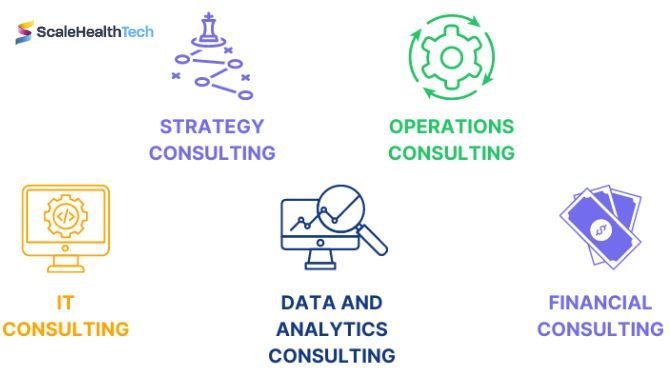Why Healthcare Providers Need Cybersecurity Consulting in 2025

As the healthcare industry continues to embrace digital technologies, the importance of protecting sensitive patient data has never been more critical. In 2025, healthcare providers face increasing cybersecurity threats, from ransomware attacks to data breaches, which can have devastating consequences for both organizations and patients. In light of these challenges, healthcare providers need to invest in Cybersecurity Consulting to safeguard their systems, data, and patient trust.
The Evolving Cybersecurity Landscape in Healthcare
The healthcare sector has become a prime target for cybercriminals due to the vast amount of valuable data it holds. Personal Health Information (PHI) is not only sensitive but also highly profitable on the black market. As healthcare organizations move towards more integrated digital systems, such as Electronic Health Records (EHR), telemedicine platforms, and connected medical devices, the attack surface expands, making them more vulnerable to cyber threats.
In 2025, healthcare cybersecurity concerns will likely intensify due to several key trends:
-
Increased Use of Connected Devices: The rise of Internet of Medical Things (IoMT) devices means that hospitals and clinics are connecting more devices to their networks. This creates new vulnerabilities that could be exploited by hackers.
-
Ransomware Attacks: Healthcare providers remain one of the top targets for ransomware attacks, where hackers demand payment in exchange for restoring access to critical data or systems.
-
Data Privacy Regulations: As data privacy laws become more stringent globally, healthcare providers must adhere to various regulations, such as HIPAA in the U.S. and GDPR in Europe. Non-compliance can result in hefty fines and loss of patient trust.
-
Telehealth Expansion: With telehealth becoming an integral part of healthcare delivery, ensuring secure online consultations and communications is paramount.
Given these rising threats, cybersecurity consulting from health consultants is essential for organizations that need to develop comprehensive strategies to mitigate these risks.
Why Healthcare Providers Need Cybersecurity Consulting
- Expertise and Knowledge of Healthcare-Specific Threats
Cybersecurity consulting firms specializing in healthcare bring a wealth of knowledge about the specific challenges faced by healthcare organizations. Health consultants understand the unique nature of healthcare systems, including EHRs, telemedicine platforms, and other sensitive medical technologies. These consultants can identify vulnerabilities within existing systems and recommend targeted security solutions to address these gaps.
Healthcare providers may lack the internal expertise to navigate the rapidly changing cybersecurity landscape. By partnering with cybersecurity consultants, healthcare organizations gain access to specialized knowledge and resources that are tailored to the needs of the healthcare sector.
- Compliance with Regulations
One of the most pressing concerns in healthcare cybersecurity is ensuring compliance with industry regulations and standards. In the U.S., healthcare providers must comply with the Health Insurance Portability and Accountability Act (HIPAA), which requires organizations to protect patient data and ensure that security measures are in place to prevent breaches. Similarly, healthcare providers operating in the European Union must adhere to the General Data Protection Regulation (GDPR).
Failure to comply with these regulations can result in significant fines, legal action, and damage to a healthcare provider’s reputation. A cybersecurity consultant can help healthcare providers stay up-to-date with ever-evolving data privacy laws and ensure that their systems and practices meet compliance standards.
- Protection Against Data Breaches
Healthcare data breaches can have devastating consequences. A breach exposes sensitive patient information, such as medical histories, billing details, and social security numbers, which can lead to identity theft, fraud, and loss of patient trust. Data breaches also damage the reputation of healthcare organizations and erode the confidence patients place in their providers.
By engaging a health consultant, healthcare organizations can implement proactive measures to safeguard their data. This includes assessing vulnerabilities, improving access controls, encrypting data, and providing staff with training on data privacy best practices. With a robust cybersecurity plan in place, healthcare providers can minimize the risk of a data breach and protect both their patients and their organization’s reputation.
- Improving Incident Response and Recovery Plans
Despite best efforts, cyberattacks may still occur. This is why it’s crucial for healthcare organizations to have an incident response plan in place. Health consultants specializing in cybersecurity can help healthcare providers design and implement effective incident response strategies to mitigate the damage caused by cyberattacks.
A well-structured response plan should include clear protocols for identifying, containing, and recovering from security incidents. Additionally, consultants can guide healthcare providers in regularly testing and updating their response plans to ensure they are prepared for emerging threats.
- Securing Telehealth and Remote Care Solutions
Telehealth has grown exponentially in recent years, especially since the COVID-19 pandemic. However, as more healthcare services move online, the risk of cyberattacks targeting telemedicine platforms increases. Hackers may exploit vulnerabilities in video conferencing software or other telehealth tools to gain unauthorized access to patient information.
Cybersecurity consultants can assist healthcare providers in securing telehealth platforms by recommending strong encryption methods, two-factor authentication, and other security measures to ensure the confidentiality and integrity of virtual healthcare services. Ensuring secure online consultations is crucial for both patient safety and provider compliance.
- Cost-Effectiveness of Preventing Cybersecurity Incidents
While hiring a cybersecurity consultant may seem like an additional expense, it can be far more cost-effective than dealing with the consequences of a cyberattack or data breach. The financial impact of a cybersecurity incident can be staggering, with costs associated with legal fees, regulatory fines, recovery efforts, and lost business.
A cybersecurity consultant helps healthcare providers adopt proactive security measures that reduce the likelihood of an attack and minimize potential damages. In this sense, investing in cybersecurity consulting can help prevent far more significant financial losses in the long run.
- Ongoing Security Monitoring and Support
Cybersecurity threats are constantly evolving, and healthcare providers need to stay vigilant to protect their systems. Cybersecurity consultants offer ongoing monitoring and support to identify new vulnerabilities and respond quickly to emerging threats.
By implementing continuous monitoring, healthcare providers can detect unusual activities, such as unauthorized access attempts or malware infections, in real-time. This enables rapid intervention to prevent a potential security incident from escalating.
- Employee Training and Awareness
Human error remains one of the leading causes of cybersecurity incidents in healthcare. Employees who are not adequately trained in security best practices may inadvertently expose the organization to risks, such as falling for phishing emails or mishandling sensitive data.
A health consultant can provide regular training sessions for healthcare staff to raise awareness about potential cyber threats and teach them how to recognize and respond to suspicious activities. This helps create a culture of cybersecurity within the organization, where everyone plays a role in protecting patient data.
Conclusion
As healthcare becomes more digital, the need for robust cybersecurity measures grows more urgent. In 2025, healthcare providers will face increasingly sophisticated cyber threats that could compromise patient data, disrupt operations, and damage their reputation. By working with health consultants who specialize in cybersecurity, healthcare organizations can ensure that they are prepared to face these challenges head-on.
Cybersecurity consulting offers healthcare providers the expertise, resources, and strategies needed to secure their systems, comply with regulations, protect patient data, and safeguard the integrity of their operations. Investing in cybersecurity consulting today not only prevents costly security breaches but also promotes trust and confidence with patients, ensuring a safer and more secure healthcare environment for years to come.
What's Your Reaction?












